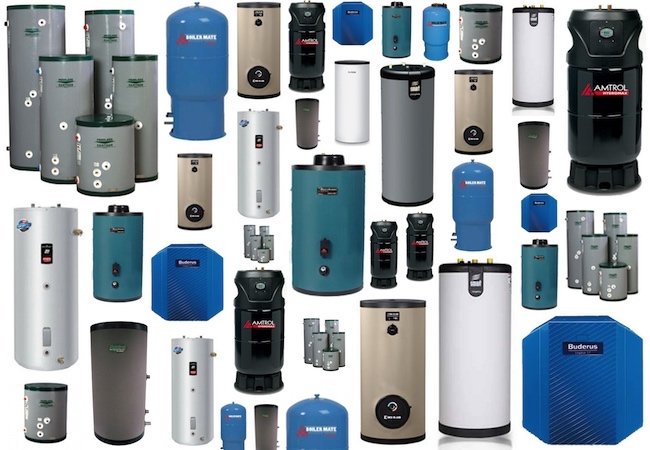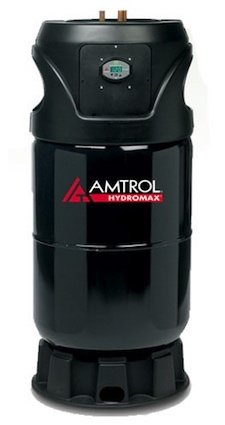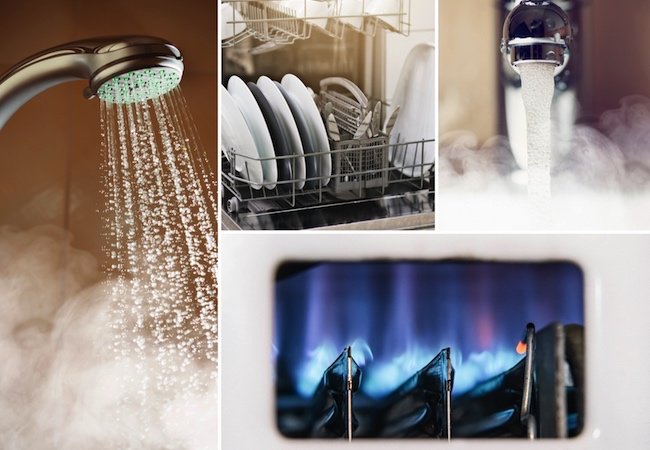

We may earn revenue from the products available on this page and participate in affiliate programs. Learn More ›
Because they’re typically out of sight—in the basement or a back closet for instance—water heaters are largely out of mind for many homeowners. Most simply take it for granted that whenever they turn on the shower or start the dishwasher, the hot water will be ready and waiting. But like it or not, when an existing hot water heater fails, even the most uninvolved homeowners have to shake off their inertia and familiarize themselves with the product landscape.
The good news is that with manufacturers competing to come up with ever more effective solutions, the category now boasts a more diverse range of options than ever before. The bad news is that without consulting a contractor, it can be difficult to determine which of the many types of water heater would be the best for your situation. As you assess the options, don’t forget to factor in one especially compelling option that often gets overlooked—indirect water heating.
Renewed Interest in Indirect Water Heaters
Indirect water heaters aren’t new—they’ve been around for decades. But today, with growing concern for the environment and rising energy costs, indirect units are enjoying renewed popularity. Why? For homeowners in certain parts of the country, indirect water heating can deliver a powerful one-two punch of energy use reduction and cost savings.
In fact, according to the Department of Energy, under ideal circumstances indirect water heaters are “the least expensive means of providing hot water” to the point-of-use fixtures you rely on every day, multiple times a day.
Given that water heaters consume a lot more energy than most people think—more energy than most other household appliances combined—opting for a high-efficiency solution can go a long way toward improving your bottom line, especially over the long term.

How Indirect Water Heating Works
The first thing to know is that an indirect water heater is, in essence, little more than a well-insulated storage tank that holds a coiled heat exchanger, though a less common version relies on a tank-in-tank design. But in either case, the “indirect” unit doesn’t produce its own heat; instead, it relies on the boiler.
In a typical arrangement, a closed-loop water pipe connects the boiler to the indirect water heater, feeding heated water to it. Though the boiler-fired water never mixes with the water in the storage tank, it circulates through the coils in the heat exchanger, which in turn heat the water for household use.
In essence, the boiler does all the work, while the indirect heater merely facilitates the transfer of heat.
When to Consider an Indirect Water Heater
If you don’t already have a boiler in your home, you can stop reading right now. According to Daniel O’Brian, a technical specialist with SupplyHouse.com, “Indirect water heaters make sense only if you need a boiler for space heating.” With forced-air HVAC equipment dominating the market, boilers are increasingly rare. If, however, your home ranks among the relative few with hydronic baseboard, radiator, or in-floor radiant heating, when you install an indirect unit, the boiler drives both systems, heating the house and the water.
Even if your boiler has been in the basement for 15 years and operates inefficiently relative to contemporary standards, O’Brian maintains that “there are obviously significant benefits associated with running only one power-devouring major appliance instead of the usual pair.”
In the summer, the situation gets a little more complicated, not least because homeowners aren’t accustomed to the boiler operating when the house doesn’t need to be heated. But in a home with an indirect water heater, the boiler still needs to snap into action intermittently to meet the household demand for hot water.
Indirect Water Heaters vs. Tankless Water Heaters
Indirect water heaters aren’t the only type of water heater designed to operate on demand. Another type of water-heater technology—tankless water heaters as they are commonly known—do the same thing. The key distinction is that the efficiency of an indirect water heater equals the efficiency of the boiler, and boilers typically outperform most water heaters. If you have a brand-new high-performance boiler capable of achieving 96 percent efficiency, you’re much better off than you would be with a tankless unit that offers 80 percent efficiency or a conventional unit with a rate of efficiency in the 60 or 70 percent range.
Installing an Indirect Water Heater
If you are interested in installing an indirect water heater in your home, O’Brian strongly recommends discussing your plans with a contractor. Portions of the work are DIY-friendly, but properly sizing an indirect water heater involves a set of complex calculations best left in the hands of a trained and experienced installer. Of course, hiring a contractor isn’t cheap, and purchasing an indirect water heater isn’t cheap either. But while the up-front costs may be considerable, indirect water heaters usually don’t need expensive service or repairs. In addition, with few moving parts and utility hookups—and with no exposure to combustion—indirect water heaters often last much longer than other types. Many manufacturers even supply a lifetime guarantee.
Whether you need to replace a broken water heater or simply wish to upgrade, O’Brian concludes, “If you have a boiler or plan to put in a boiler, an indirect unit stands out as a clear choice” for reliable, cost-effective water heating. If you’re tired of dreading the arrival of your utility bills, take the next step toward investigating whether an indirect water heater would make sense for your needs, your budget, and your home. Don’t know where to begin? You can start by visiting SupplyHouse.com right now to explore a broad selection of indirect water heaters and accessories from the biggest names in the category, including Buderus, Amtrol, Bradford White, and Weil-McLain. Don’t worry: If you end up having any questions along the way, customer service experts are always on hand to provide assistance.

